A Writer’s Twelve Days of Christmas Memories
December 25 marks the first of Twelve Days of Christmas.
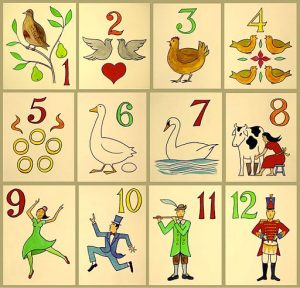
Supposedly the Twelve Days of Christmas refers to the days between Christmas and Epiphany on January 6.
The first known print version of the song we know appeared in England in 1780 in a children’s book entitled Mirth and Mischief, which presents it as a cumulative memory-and-forfeits game. The subtitle, “Sung at King Pepin’s ball,” suggests it originated in France a millennium prior. The only known King Pepin, 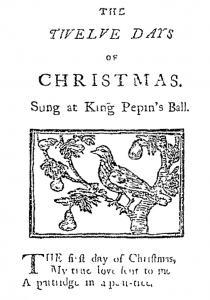 father of Charlemagne, ruled France 752-768.
father of Charlemagne, ruled France 752-768.
As a child I wondered whose Christmas was twelve days long. Mine was only one. Considering the antiquity of the song, it’s no wonder I scratch my head at a Christmas lasting twelve days. And at the assorted birds and strange personages considered plum presents.
As an adult I wonder how twelve days of Christmas memories might look. So why not a cumulative blog beginning twelve days before the Big Day?
The First Day of Christmas
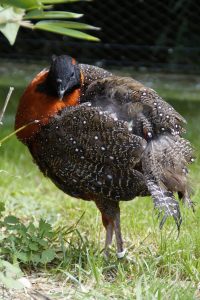 On the First Day of Christmas, my true love gave to me a partridge in a pear tree. Hmm. Pear trees don’t grow outside my back door. Nor would I know what to do with a partridge if on Christmas Day my true love presented me one perched in a pear tree.
On the First Day of Christmas, my true love gave to me a partridge in a pear tree. Hmm. Pear trees don’t grow outside my back door. Nor would I know what to do with a partridge if on Christmas Day my true love presented me one perched in a pear tree.
But I’ve set up a Christmas tree or two in 70 years of life. The earliest tree in my memory wore a frock of silver icicles. Beneath her petticoats lay treasures galore: a china tea set, a dolly in a carriage, and a rocker of my own.
However, what dangled in her boughs like partridges in pear trees were bright ornaments galore. I recall their shapes. Their colors. And their textures.
Matter of fact, I’ve saved a few.
One brings to mind a far-off star that came to Earth when a certain Prince was born.
The pink one reminds me of my dolly’s blanket.
Ribbon candy.
And a blue norther (a term known as Texas speak) .
These old ornaments aren’t partridges. Or a pear tree. But they’re symbols, all the same … of true love–my parents’ and God’s. No partridge or pear tree can compare.
The Second of Twelve Days of Christmas
 On the Second Day of Christmas, my true love gave me two turtle doves. Again, turtle doves don’t hang out around my house in Central Texas. But according to Wikipedia, they’re common in Great Britain and Europe.
On the Second Day of Christmas, my true love gave me two turtle doves. Again, turtle doves don’t hang out around my house in Central Texas. But according to Wikipedia, they’re common in Great Britain and Europe.
What I love most about these featured friends is they generally bond for life. Isn’t that sweet? No wonder they’re Day 2.
This reminds me of my parents on all those Christmas mornings 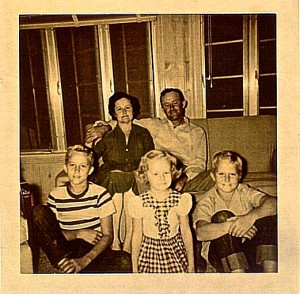 growing up. Often holding hands, they had way more fun sitting to the side watching us than we did opening packages. Their smiles outdid the tree lights.
growing up. Often holding hands, they had way more fun sitting to the side watching us than we did opening packages. Their smiles outdid the tree lights.
I’m so grateful they paired for life.
The Third of Twelve Days of Christmas
 When asked what comes in 3s at Christmastime, who doesn’t think Wise Men? Or the three Christian virtues–faith, hope, and love–or the Holy Trinity? I often think of us three Brooks kids (before there was Dale, the fourth): Jerry, Dalton, and Linda. But if you peek into Mirth and Mischief, you’ll find another threesome: three French hens.
When asked what comes in 3s at Christmastime, who doesn’t think Wise Men? Or the three Christian virtues–faith, hope, and love–or the Holy Trinity? I often think of us three Brooks kids (before there was Dale, the fourth): Jerry, Dalton, and Linda. But if you peek into Mirth and Mischief, you’ll find another threesome: three French hens.

What’s so great about French hens? Well, the term crève-cœur refers to a broken heart. So maybe the poet figured a trio of Crèvecœur fowls, one of the oldest French breeds, could mend a maid’s broken heart thrice over. Besides, they’re known for their excellent egg production, meat quality, and friendliness.
 However the best party-of-three in my box of Christmas memories has to be my triplet grandchildren in 2005: Ethan, Ella, and Davis.
However the best party-of-three in my box of Christmas memories has to be my triplet grandchildren in 2005: Ethan, Ella, and Davis.
The Fourth of Twelve Days of Christmas
On the fourth day our famous giver presents his true love four colly birds. (We now say calling birds, but the original is colly, which means black as coal–the common blackbird.)
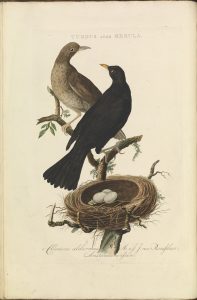
Check out Wikipedia’s recordings of blackbirds’ songs. They’re actually quite nice, which surprises me. The black birds that hung around our farm when I was girl produced a “caw” like crows. Not something you’d give someone you love.
The song’s four colly birds brings to mind my three brothers and me as an acapella quartet. We were the Brooks Quartet, known only to family and a handful of friends. Our mother thought we were the bees’ knees, so prior to her death we recorded some songs for her funeral. We wore black, and we sang, (Mother would have loved it) so I guess you’d say we gifted her with four colly calling birds. You can listen here:
The Fifth of Twelve Days of Christmas
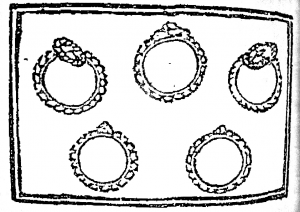 Five gold rings arrive on the fifth day of Christmas.
Five gold rings arrive on the fifth day of Christmas.
Thus far the singer’s true love has presented a flock of fowls to tend. So why the departure into jewelry? Your guess is as good as mine.
Something tells me the giver of gifts knew he’d pushed his luck as far as he could. Better come up with something grand.
 Like a golden ring for each finger of his love’s left hand.
Like a golden ring for each finger of his love’s left hand.
Works for me.
Meanwhile, the only memory of five I’ve come up with is the size of the “perfect” family of the ’50s: 5.
The Sixth of Twelve Days of Christmas
 A half-dozen geese arrive on our singer’s front doorstep on day six. Not ordinary geese, mind you. These geese are a-laying.
A half-dozen geese arrive on our singer’s front doorstep on day six. Not ordinary geese, mind you. These geese are a-laying.
Now, if these six girls have been swimming with a dandy suitor, they could produce a flock in less than a month.
 But if they’re bachelorettes, six geese can produce more eggs than the lady of the house cares to prepare. Their eggs can be two to four times the size of a chicken egg. That’s a lot of scrambled eggs, folks.
But if they’re bachelorettes, six geese can produce more eggs than the lady of the house cares to prepare. Their eggs can be two to four times the size of a chicken egg. That’s a lot of scrambled eggs, folks.
 Geese are better watchdogs than … well, watchdogs. They’re supposedly credited with saving Rome from a total sack by the Gauls a couple thousand years ago. The dogs slept through the enemy invasion, but the geese created a racket that woke up the Romans and kept the house from coming down completely.
Geese are better watchdogs than … well, watchdogs. They’re supposedly credited with saving Rome from a total sack by the Gauls a couple thousand years ago. The dogs slept through the enemy invasion, but the geese created a racket that woke up the Romans and kept the house from coming down completely.
A word to the wise: Don’t ruffle the feathers of a gander. He’s one tough critter. Which reminds me of my mother. You didn’t mess with her kids. Or you’d regret it.
The Seventh of Twelve Days of Christmas
Are there more graceful creatures in the world? Or more romantic? Sigh …
But what would I do with seven birds with a wingspan of ten feet each? I can’t imagine all seven  trying to take off and land from the bird bath out back.
trying to take off and land from the bird bath out back.
I love that they’re monogamous. And fierce protectors of their young. Something tells me that’s exactly why the suitor in this old song gave his loved one seven swans a-swimming. He was promising to love her and be true to her seven times seven! A sign of good things to come.
One memory of swans stands out. Way back in the early ’70s our family lived in West Germany. The Sound of Music had been filmed not far away–in the Salzburg, Austria area. So off we puttered in our little Fiat to Salzburg where we found the grand estate … the gazebo … the lake … and the swans. Those photos are somewhere in a bin of old photos. When I find them, you’ll be the first to know.
The Eighth of Twelve Days of Christmas
 On Day Eight our suitor sends his loved one eight maids a-milking.
On Day Eight our suitor sends his loved one eight maids a-milking.
Now I ask you … Why would a man woo his lady with eight unmarried young women, milking or otherwise?
 Apparently when the phrase “let’s go a-milking” was common, it communicated something akin to “let’s go spooning” or “let’s get hitched.” In that case, a maid and her milk cow could represent a marriage proposal. Eight maids and eight cows would knock off the recipient’s stockings. Why?
Apparently when the phrase “let’s go a-milking” was common, it communicated something akin to “let’s go spooning” or “let’s get hitched.” In that case, a maid and her milk cow could represent a marriage proposal. Eight maids and eight cows would knock off the recipient’s stockings. Why?
 Milk wasn’t just a nutritious drink, but from it came butter, cheese, buttermilk, yogurt, custards, etc. But it wasn’t as conveniently available in the 15th-19th centuries as in the 21st. No mechanized dairy farms. Plastic gallon jugs. Waxed cardboard half-gallons. Or refrigerated grocery shelves. Matter of fact, milk was only available to those who could afford to graze at least one cow or goat and a little patch of grass to feed them. Add many more, and they’d need a barn to house them, a large family or staff to milk them, and acreage to feed them.
Milk wasn’t just a nutritious drink, but from it came butter, cheese, buttermilk, yogurt, custards, etc. But it wasn’t as conveniently available in the 15th-19th centuries as in the 21st. No mechanized dairy farms. Plastic gallon jugs. Waxed cardboard half-gallons. Or refrigerated grocery shelves. Matter of fact, milk was only available to those who could afford to graze at least one cow or goat and a little patch of grass to feed them. Add many more, and they’d need a barn to house them, a large family or staff to milk them, and acreage to feed them.
To Milk or Not To Milk
I was reared on a farm where a milk cow or two provided our family with milk and butter. Mother could have made chees e, buttermilk, and yogurt if she had wanted. The big difference: Mother had a choice.
e, buttermilk, and yogurt if she had wanted. The big difference: Mother had a choice.
Back when this song was created, a girl had to be born to–or married into–the wealth required for a stable of cows and milk maids. What girl wouldn’t want to marry an amorous fellow who could afford to give away eight cows and the girls to milk them?
 This spooning dude possessed more than a single gold coin or two. Change jingled in every pocket as he hooked his thumb at his chest and declared, “Stick with me. I’ll take you a-milking.”
This spooning dude possessed more than a single gold coin or two. Change jingled in every pocket as he hooked his thumb at his chest and declared, “Stick with me. I’ll take you a-milking.”
I figure this fair maiden planned to accept his proposal all along. So far she’s received a partridge, a pear tree, two turtle doves, three black birds, four French hens, five golden rings, six laying geese, seven swimming swans, and now eight milk maids.
Why not hold out a bit longer? She might get lucky and find nine drummers on her front lawn tomorrow.
The Ninth of Twelve Days of Christmas
 Sure enough on the ninth day, nine drummers arrive at our maid’s front door, all of them a-drumming.
Sure enough on the ninth day, nine drummers arrive at our maid’s front door, all of them a-drumming.
Why would a young lady welcome such racket?
As it turns out, drums were associated with trumpets which announced the arrival of each course during banquets. And heralded important personages.
Ahh. Now I see. The suitor of Twelve Days fame was making a point with his true love. Their wedding feast would consist of nine courses, each announced by an additional drummer. And there be so many important guests it would take nine drummers to announce them all.
This girl’s got a catch!
The Tenth of Twelve Days of Christmas
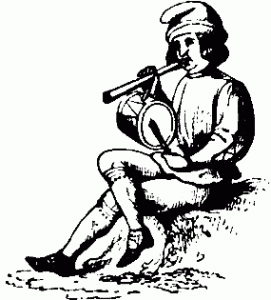
As if the gifts thus far didn’t raise the roof high enough, on the tenth day of Christmas our suitor gives his loved one ten pipers piping.
Which makes sense, actually. Pipes (known as fifes) and drums (known as tabors) were a part of the merriment music at medieval celebrations.
Not only is this groom affluent enough to purchase a bevy of fowls, he possesses enough property to house and maintain the birds and eight cows in barnyard, forest, and lake.
This guy has the means to throw a party his guests won’t forget. Our maid should prepare herself for some serious merrymaking.
The Eleventh of Twelve Days of Christmas
 Our groom has spared no expense. He’s gifted his loved one in abundance. The pipers are piping. The drummers are drumming.
Our groom has spared no expense. He’s gifted his loved one in abundance. The pipers are piping. The drummers are drumming.
It’s party time!
The guests arrive–starting with eleven lovely ladies, all of them, dancing.
 Imagine what a colorful sight this medieval event must have been. I visualize brocade and silk gowns and a rainbow of bright veils and scarves.
Imagine what a colorful sight this medieval event must have been. I visualize brocade and silk gowns and a rainbow of bright veils and scarves.
My only memory that involves eleven of anything is my eleventh birthday party.
My father treated us kids to a hayride while Mother (due to deliver a baby any minute) and two of her friends prepared our spot in the park.
The drinks were iced in a big tin pan. The weiners were sizzling on a hot grill. The buns and chips were ready. The cake was covered until the perfect time to unveil it … when an ambulance screamed past the park … headed in the direction of our excursion.
ready. The cake was covered until the perfect time to unveil it … when an ambulance screamed past the park … headed in the direction of our excursion.
Mother said later that her heart skipped a beat as she wondered if something had happened to one of us. Surely not.
As it turned out, something had happened. One of the boys had tried to climb into the cab of the truck, and an overhanging tree limb knocked him through the air and plopped him onto the ground, bloodied.
Thank God, what could have been a tragedy of immense proportions turned out all right in the end. The boy sustained injury but was himself soon.
My eleventh birthday celebration was punctuated by terror that turned into thanksgiving. My little brother was born the next day–the best belated birthday gift ever!
The Twelfth of Twelve Days of Christmas
Twelve leaping lords appear as the final act.
Imagine the display of wealth. Fowls and cows with their maids. Drums and drummers. Pipes and pipers. And ladies dancing.
Now the courtly men join them in a not-so-ordinary display of dancing.
Men danced with swords or antlers prior to battle and at grand celebrations in the Middle Ages. Their accompaniment: drums and fifes. Their dances involved great leaps that signified power and fertility–the higher the leap, the greater the victory or harvest.
As far as memories these dozen days bring to mind … A child’s song from church when I was growing up went something like this … There were twelve apostles Jesus called to help Him. Simon Peter, Andrew, James, and his brother John, Philip, Thomas, Matthew, James the son of Alphaeus, Thaddeus, Simon, Judas, and Bartholomew.
So there you have it, the Twelve Days of Christmas. Twelve days of feasting, music, and dancing. Twelve fantastic gifts. An ecstatic bride and groom. And a bunch of over-stuffed, partied-out guests staggering home.
P.S. Here are a few of the “days” featured on the Christmas tree skirt I made forty years ago: 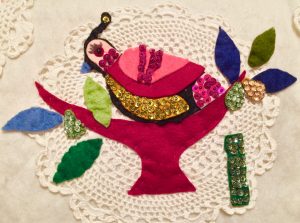
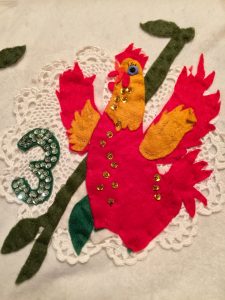
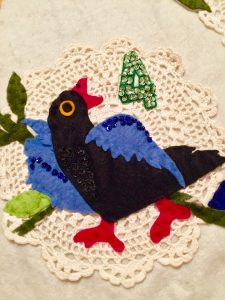




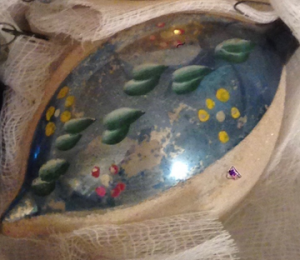

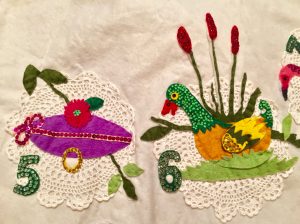
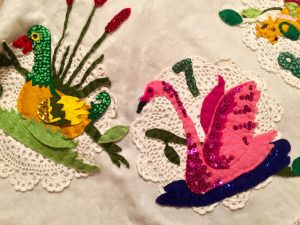

It was always such a treat to be in church when your dad or Jerry or Butch was leading the singing. Once in a while a rare solo from one of them. I heard the Brooks Quartet once and was awestruck. I wish I could have heard more. Such sweet memories.
Aww. Thank you, Kita. Yes, it was a treat for Daddy, Jerry, Butch … and later on, Dale … to lead the singing. Dale’s the bass singer in the recording, by the way. Little Dale!
Love and Christmas blessings on you and yours! Linda
Thank you for sharing. I remember trees with icicles and similar ornaments. This is going to be so much reading each day until Christmas.
How sweet of you, Marilyn. So glad you joined in. It’s fun looking at the various “Twelve Days” gifts and thinking how they might apply to our times and illustrate the real meaning of Christmas. Way back in 1976 I appliquéd a tree skirt showing the 12 Days. I’ll include a photo of it soon. 🙂